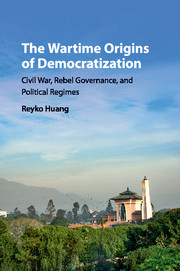Book contents
- Frontmatter
- Contents
- List of Figures
- List of Tables
- List of Acronyms
- Acknowledgments
- 1 Introduction
- 2 War-Making, Mobilization, and Democratization
- 3 Rebel Governance: How Rebels Interact with Ordinary People During Conflict
- 4 Testing the Effects of Rebel Governance on Postwar Democratization
- 5 Tracing the Steps from War Time to Peace Time: Case Studies Overview
- 6 War and Change in Nepal
- 7 War and Postwar Regime Formation in Uganda, Tajikistan, and Mozambique
- 8 Conclusion
- Appendix Rebel Governance Dataset: Notes, List of Cases, and Summary Statistics
- Bibliography
- Index
2 - War-Making, Mobilization, and Democratization
Published online by Cambridge University Press: 05 September 2016
- Frontmatter
- Contents
- List of Figures
- List of Tables
- List of Acronyms
- Acknowledgments
- 1 Introduction
- 2 War-Making, Mobilization, and Democratization
- 3 Rebel Governance: How Rebels Interact with Ordinary People During Conflict
- 4 Testing the Effects of Rebel Governance on Postwar Democratization
- 5 Tracing the Steps from War Time to Peace Time: Case Studies Overview
- 6 War and Change in Nepal
- 7 War and Postwar Regime Formation in Uganda, Tajikistan, and Mozambique
- 8 Conclusion
- Appendix Rebel Governance Dataset: Notes, List of Cases, and Summary Statistics
- Bibliography
- Index
Summary
When do states emerging from civil war enter the path toward democracy? When do they instead become authoritarian? What explains the divergence in political regime trajectories among post–civil war states? The search for the causes of democracy and autocracy has a long and venerable pedigree in political science, and lively debates on the issue continue along various theoretical lines. The question of democratization among post–civil war states, however, takes on a new urgency at this point in our historical and scholarly development due to a peculiar convergence of phenomena in the realms of knowledge, ideas, and practice. In terms of knowledge, a large body of research has examined what factors allow the elusive peace to stick and endure after violent internal conflict. Some of these factors, such as peacekeeping, could be directly translated into domestic or international security policy. At the same time, there has been a recognition that not all peace is created equal; that more than the mere absence of war, what is of both strategic and normative importance in these fragile states is that there be a peace in which citizens enjoy basic political and socioeconomic rights (and thus we enter the realm of ideas). Aside from the security implications of different types of internal peace, this emphasis on rights, liberties, and democratic governance has emerged as part of a broader post–World War II, largely Western discourse on human rights. Systematic research that goes beyond examination of the durability of peace to explore the determinants of specific types of peace, however, remains as yet underdeveloped. Finally, in the domain of practice, the post–Cold War era has seen a series of large-scale international interventions in conflict and postconflict states. These interventions aimed not only at keeping the peace, but also at helping to build stable and democratic institutions. However, academics and policymakers continue to debate the fruitfulness of these interventions from both instrumental and normative standpoints. Remarkably, even in the absence of international interventions leaders in postconflict states have often chosen to hold multiparty elections and invite external elections monitors, seeing that there are certain benefits to be reaped by creating at least the trappings, if not the genuine institutions, of democracy.
- Type
- Chapter
- Information
- The Wartime Origins of DemocratizationCivil War, Rebel Governance, and Political Regimes, pp. 16 - 49Publisher: Cambridge University PressPrint publication year: 2016



